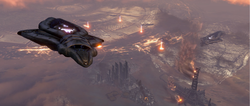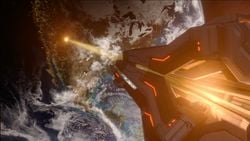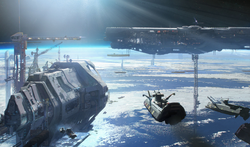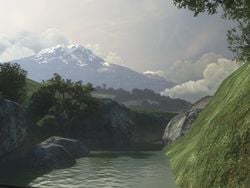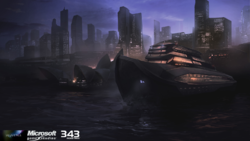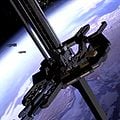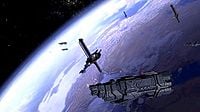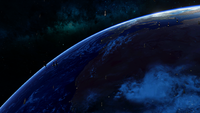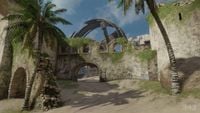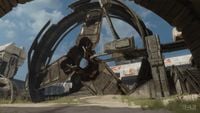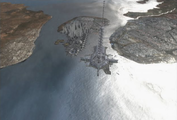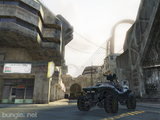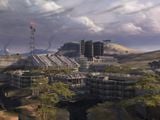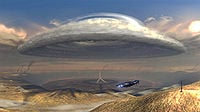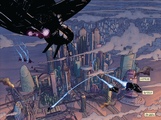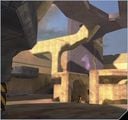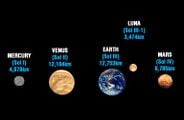Earth: Difference between revisions
From Halopedia, the Halo wiki
CMDR RileySV (talk | contribs) (Updated some citations, added some info, set a few more red links for future pages.) |
|||
| Line 344: | Line 344: | ||
*''[[Halo: Lone Wolf]]'' | *''[[Halo: Lone Wolf]]'' | ||
*''[[Halo: Renegades]]'' | *''[[Halo: Renegades]]'' | ||
*''[[Halo: Shadows of Reach]]'' | |||
**''[[Sacrifice]]'' {{Mo}} | |||
{{col-end}} | {{col-end}} | ||
Revision as of 15:33, November 6, 2020
| There is more information available on this subject at Earth on the English Wikipedia. |
| Earth | |
|---|---|
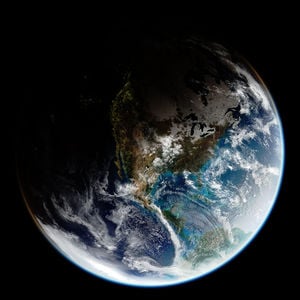
| |
| Astrographical | |
|
System: |
|
|
Orbiting: |
|
|
Orbital position: |
Third planet[1] |
|
Moon(s): |
|
| Physical | |
|
Diameter: |
12,756 kilometers (7,926 mi)[1] |
|
Gravity: |
1.0 G[1] |
|
Length of day: |
24 hours[1] |
|
Length of year: |
365.2 days[1] |
|
Atmosphere: |
|
|
Surface temperature: |
-20°C to 40°C (-4°F to 104°F)[1] |
| Societal | |
|
Species: |
|
|
Population: |
|
|
Government: |
|
- "Fight for her."
- — Bulletin board poster of Earth
Earth, also known as Sol III,[8] known in the Forerunner era as "Erde-Tyrene"[9] (pronounced "Er-da-ty-reen")[10] or "Erda",[11] is the third planet and one of four terrestrial worlds of the Sol system. It is the presumptive homeworld of the human species, though this was disputed by some ancient humans, due to the loss of records to technological dark ages and the presence of human ruins on other worlds.[12] It is the current capital world of the Unified Earth Government, and home to the headquarters of the United Nations Space Command.
With a population of around ten billion, Earth was the most populated planet in UEG territory prior to the Covenant invasion. Despite being dramatically reduced during the Covenant invasion in 2552 due to both casualties inflicted by the Covenant and a major evacuation effort, the population had again risen to several billion by the end of 2553.[3]
History

Prehistory
- Main articles: Prehistoric human civilization, Erde-Tyrene civilization
The remains of a deceased Catalog unit, and a damaged monitor, which revealed that humanity achieved its earliest known spacefaring technological state prior to 1,100,000 BCE and that Forerunners believed humans had "moved their interstellar civilization outward along the galactic arm" by 150,000 BCE. Not only is the dating for humanity's origin less sure now, but the very idea of Earth has humanity's birthplace has also been revealed to have been a matter of debate for the civilization that preceded and witnessed the human-Forerunner wars and some Forerunners. That ancient empire had lost many of the records that could have proven or disproven the issue, and human ruins had also been discovered on multiple worlds beside Earth from forgotten eras of prehistory. Regardless of when and how humanity first evolved and developed, it is clear that humans were present on multiple planets over a million years ago, and it was not until thousands of years into this civilization that leading human scientists traced the species' origins to Earth.[12]
Spreading across the Orion Arm of the Milky Way Galaxy, humanity underwent several periods of technological and social regression, losing most of their records in the process. Earth was one of the first human worlds to fall to the Forerunners in the human-Forerunner wars.[11] After being defeated by the Forerunner civilization, most humans were exiled to Earth, with their civilization dismantled, populations splintered amongst the many human species and their culture degrading back to a primitive state for millennia.[9] Earth and humanity came under the charge of the Forerunner Lifeshaper, the Librarian, who helped the humans slowly work towards rebuilding a primitive civilization. Remnants of their former technology, such as steam power and hot-air balloon flight, were re-learned under her care but later forgotten after the firing of the Halo Array.[9]
Forerunner-Flood war

Near the end of their war with the Flood, the Forerunners, specifically the Lifeworkers under the direction of the Librarian, indexed many of Earth's species - including humans - as a part of their Conservation Measure to preserve life in the galaxy after the activation of the Halo Array. Prior to the activation, after surveying the planet, beacons were activated informing humans imprinted with the Librarian's geas to gather to evacuate the planet. Lifeworkers only had time to evacuate one out of a thousand of the planet's large species; countless species would be left behind. Several days into the evacuation the Librarian and IsoDidact arrived in the system to speak with Catalog. The evacuation was halted ahead of schedule as the Flood had broken through the local Forerunner defenses and were entering the system.[13]
After the Ur-Didact composed most of the human population on Omega Halo, the Librarian realized the remaining population would not be enough to repopulate the species. She sent Chant-to-Green to see how much the Flood had taken in the system and save whatever humans she could. The Flood had left Earth untouched after the Forerunners evacuated. Chant was only able to gather a few hundred humans to send to Installation 00. When Precursor star roads began to appear in the system, she told Chant she would stay on Earth and gave Chant the title of Lifeshaper. Later, a Gargantua-class transport arrived to be disassembled and reconfigured, and after gathering the necessary materials, formed a portal to the Ark.[14]
Reseeded
Circa 97,445 BCE, humans were returned to Earth and watched as the Portal at Voi was buried.[15] With human life reseeded on Earth, it successfully re-developed.[16] World War II came to a close with the first usage of human Nuclear weapons at Nagasaki and Hirshima.[17] The bomb at Hiroshima left a domed structure still standing.[16] In 1961, Soviet cosmonaut Yuri Gagarin would be the first human being to orbit the Earth.[18]
New interplanetary colonization and conflicts
- Main articles: Jovian Moons Campaign, Rain Forest Wars, Argyre Planitia Campaign, Interplanetary War
By 2080, humanity's national governments, under the auspices of the United Nations, had begun to establish colonies on the other planets in the Sol system. However, expansion did not come without problems. In the mid-22nd century, two major dissident factions emerged; the neo-communist Koslovics and fascist Frieden, which began to battle one another and the United Nations.[19]
In March–June 2160, Jovian Frieden secessionists attacked United Nations Colonial Advisors on the moon Io, which led to three months of fighting between the Earth military and Jovian Frieden forces. National governments began to support their own colonies which sparked proxy wars off-planet, leading to tension and militarization on Earth. In 2162, armed conflict ripped through South America, starting the Rain Forest Wars, as Koslovic, Frieden, and UN forces all clashed over ideological differences, sparking additional conflicts off-planet. In December of 2163, the three factions clashed, this time on Mars. This was the first extraterrestrial use of Marines, who launched lightning raids on Koslovic positions, permanently affecting military doctrine for centuries. In 2164, UN forces began a massive military build-up and began the first true interplanetary war. The forces of the fledgling United Nations Space Command were significantly bolstered by a massive propaganda campaign running on the victories on Mars and over the next six years took back the Sol system and drove the dissident factions to destruction. Now with a massive military with no enemy to fight, overpopulation, famine, and a collapsing economy, the newly unified Earth faced an uncertain future.[19]
The year 2302 saw the beginning of construction on the Mombasa Tether,[20] the first Space elevator on Earth.[21] Conditions on Earth had deteriorated significantly and by 2310, catching a ride on a new colony ship became appealing to some.[22] In 2332, the Ross-Ziegler Blip was discovered in Earth's carbon and fossil records.[23]
The Human-Covenant War
- Isabelle: "You know when I was living on Mamore, I thought that Earth was really cool, but it's a dump."
- Kamal Zaman: "Well, what do you expect from a place called dirt?"
- — Isabelle and Kamal Zaman talking about Earth, 2552.[24]
- Main article: Human-Covenant War
During the entire course of the conflict, the UNSC followed the Cole Protocol, which declared that no UNSC vessel targeted by the Covenant was to retreat to Earth, as a means of ensuring the secrecy and security of the planet's location. In nearly twenty-seven years of galactic warfare, the Covenant never succeeded in determining the location of Earth through the measures taken under the Cole Protocol. However, by September, 2552, Earth was humanity's last major stronghold in its war against the Covenant. Nonetheless, the UEG and UNSC maintained plans for an emergency exodus of heavy industry from Earth and Mars, in the event that Earth's position was compromised. Following the disastrous Fall of Reach, these plans were put into effect, due to the Navy's belief that the Earth would be the aliens' next target.[25]
Just prior to the battle for Earth, a faction of Spartan 1.1s stockpiled resources on Earth in case the Covenant invaded.[26]
Despite the effectiveness of the Cole Protocol, on October 20, 2552, the Covenant launched their first attack upon Earth, rendering the Cole Protocol moot and initiating the final confrontation between UNSC forces and the Covenant.[27][28]
Battle of Earth
- Main article: Battle of Earth
- "The entire population of Earth was cut in half as the first battle of Earth began..."
- — Halo Encyclopedia[2]
On October 20, 2552, the first Covenant forces entered the Sol system. A Covenant expeditionary force consisting of battlecruisers and assault carriers arrived in system, first detected around Io, the third largest moon of Jupiter.[28] After the existence of the Covenant presence was confirmed by probes, the UNSC forces went to full alert. The option was taken to wait for the Covenant forces to come to them rather than let Fleet Admiral Harper launch a counter attack. The Covenant began to work on punching a hole through the orbital defenses by taking out the stations in the battle cluster above the Mediterranean Sea via bombs planted by boarding parties.[28] After the Covenant fleet attempted to rush through the newly formed gap the UNSC fleet annihilated them, destroying most of the Covenant battlecruisers but failing to destroy the assault carriers. One of the assault carriers was successfully destroyed by SPARTAN-II John-117 but the other, commanded by the High Prophet of Regret assaulted the city of Mombasa in Kenya.[29]
Groundside, the Covenant assault carrier had already deployed its ground forces and occupied the city. The Covenant ground forces immediately constructed defense emplacements and structures to reinforce their newly-acquired sites against the counter-offensive UNSC forces. The UNSC In Amber Clad was the first UNSC ship to respond to the Covenant occupation. The ship sent in their complements consisting of SPARTAN-II John-117, Sergeant Avery Johnson and elements of the 7th Orbital Drop Shock Trooper Battalion.[29] The Covenant were subsequently dislodged from Old Mombasa and, following the destruction of a Type-47A Scarab, from New Mombasa as well.[29][30] The High Prophet of Regret eventually ordered a general retreat and had his assault carrier initiate a slipspace jump while still over the city. The In Amber Clad followed in the carrier's wake, while the city was left in chaos.[30] Following this, Covenant reinforcements arrived at Mombasa to begin digging through to a Forerunner artifact buried under the city.[31]
The Covenant continued to assault the planet with even more forces being deployed all across Earth. At Mount Erebus, the sea floor off of the Yucatan Peninsula, and at the Centennial Orbital Elevator in Havana, Cuba, the Covenant were stymied by the three SPARTAN-IIs of Blue Team, who were re-deployed to Onyx soon after.[32] Cleveland, Ohio as well was hit but this attack too was repulsed through the efforts of ODST forces and the self-sacrifice of Colonel James Ackerson.[33] The Covenant also attacked Sydney, home of the UNSC Headquarters, HIGHCOM Facility Bravo-6. Fortunately, despite the enormous damage inflicted on the city, the UNSC HQ survived completely unharmed, owing to its underground facilities.
The arrival in-system of SPARTAN-117 in a Covenant-controlled Forerunner Dreadnought, freshly escaped from the Battle of Installation 05, was unexpected.[34] SPARTAN-117 disembarked from the dreadnought in Earth's atmosphere, later recovered by Marines and taken to Crow's Nest.[35] With the aid of the Arbiter, Commander Miranda Keyes, and Sergeant Avery Johnson, SPARTAN-117 breached the Covenant anti-air defenses near the excavated artifact, clearing the way for an aerial strike on the Dreadnought powering it.[36][37] The strike was unable to disable the device or prevent the Prophet of Truth from traveling through the portal. After a brief intervention by the Flood a joint Sangheili/UNSC force departed through the portal in pursuit.[38] Some of the final remaining Covenant forces were defeated in December in Operation: MARSH FLASH, in Arizona, United Republic of North America.[39]
Post-War period
Following the victory at the Battle of Earth and the Battle of Installation 00, the Human-Covenant War officially came to an end in March of 2553 with a ceremony at Voi.[40] Project Rebirth was initiated sometime afterward to repair locations damaged by the battles on Earth.[41]
Only two years after the end of the war, Earth faced yet another invasion, this time led not by a hostile alien hegemony, but a Forerunner ancilla, 000 Tragic Solitude, the monitor of Installation 00. As a means to repair the Ark and to get revenge on humans for damaging it, the monitor tricked the UNSC into opening the portal which allowed him to send thousands of Retriever Sentinels to mine Earth for raw resources. The sentinels were engaged by the Home Fleet, which lost at least ten ships in the ensuing battle. Tragic Solitude's plans were thwarted by a joint UNSC and Swords of Sanghelios team on the Ark itself.[43]
In July 2557, the Forerunner known as the Didact arrived in-system aboard his flagship, the Mantle's Approach, planning to use a device known as the Composer to enslave humanity. Having been forewarned by the now Captain Thomas Lasky of the UNSC Infinity, along with Battle Group Dakota engaged Mantle's Approach. Meanwhile, Master Chief John-117 had stowed aboard the Mantle's Approach and with help from the Infinity, boarded the ship. Before the Master Chief could stop the Didact, the Composer began to fire on New Phoenix, Arizona, digitizing its entire population. John-117 eventually destroyed the ship with a nuclear device, ending the threat of the Didact and the Composer for the time being.[42]
Sometime after that, a foiled threat of nuclear bombing by a Covenant refugee took place in Rio de Janeiro.[45]
Rise of the Created
In October 2558, Cortana reemerged as the self-proclaimed leader of the Created, a collective alliance of human and Forerunner AI constructs whose aim was to enforce the Mantle by bringing the entire galaxy under the control of AIs. This plan called for several Guardians to be deployed across the galaxy to systematically disable all technology across human space. One such Guardian was deployed to Earth. Unfortunately, it proved too powerful for even the Infinity and the vessel was forced to abandon Earth for deep space. All technology on Earth and all orbiting vessels were disabled.[46]
Topography
Planetside
Planetside, Earth has seven continents. Three continents are Africa, Asia and Antarctica.[47]
Locations
Post-Great Purification
|
Pre-Great Purification |
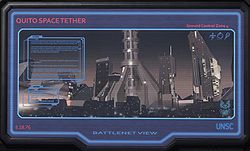
Orbital
- Moncton-class orbital weapon platform
- Athens Station
- Cairo Station - An ODP defending Earth. It was the command center of Earth's defense by Admiral Hood.
- Malta Station
- Nassau Station
- Oaxaca Station
- Station Wayward Rest
- Quito Terminus
- Munera Platform A7
Government and society
By the 26th-century, the United Nations is the acting administrative body for the National governments of the planet.[7] The Unified Earth Government and United Nations Space Command are based on Earth, specifically in Sydney, Australia.[51][52]
Gameplay
Halo 2
- Main article: Halo 2
In Halo 2, a total of four Campaign levels take place on or above Earth. The Armory and Cairo Station take place in space above Earth. Parts of Europe, Africa and the Middle East can be seen. Outskirts and Metropolis take place on Earth in the city of Mombasa in Africa. The final cutscene of the game in The Great Journey also takes place above Earth.
A number of multiplayer maps also take place on or above Earth. Midship and Elongation take place in orbit above the Earth, showing the same view of Earth as The Armory and Cairo Station. Terminal, Turf, District, Ivory Tower, Tombstone, Headlong, Zanzibar, and Foundation all take place on Earth in various places.
Halo 3
- Main article: Halo 3
Each Halo 3 campaign level from Arrival to Floodgate take place on Earth in Tanzania or Kenya. The final cutscene in Halo also takes place on Earth.
High Ground, Last Resort and The Pit from the original line up of Halo 3 multiplayer maps take place on Earth. The Heroic Map Pack maps, Blackout and Ghost Town of the Legendary Map Pack, and Orbital and Longshore of the Mythic Map Packs were eventually added that all took place on Earth.
Halo 3: ODST
- Main article: Halo 3: ODST
All the campaign levels and Firefight maps of Halo 3: ODST take place on Earth.
Halo: Reach
- Main article: Halo: Reach
Only one map in Halo: Reach takes place on Earth and that is Breakneck, which is set in Section 21 of Mombasa.
Halo 4
- Main article: Halo 4
A large portion of the level Midnight is set on the Mantle's Approach resting above New Phoenix, Earth. North America and parts of South America can be seen in the skybox of the level. The Epilogue also shows some scenes in the Earth city of New Phoenix.
Halo: Spartan Strike
- Main article: Halo: Spartan Strike
All of the missions as part of Operation A: Orphic Spear and Operation E: Brother's Keeper take place in Mombasa and New Pheonix respectively, both on Earth.
Halo 5: Guardians
- Main article: Halo 5: Guardians
The final cutscene of Guardians features the UNSC Infinity over Earth. Only one multiplayer level takes place over Earth however and that is Breakout Arena, set on Munera Platform A7. Parts of Eastern Europe, the Arabian Peninsula and Northern Africa can be seen in the skybox as the planet rotates.
Gallery
- WarfleetEarth.png
Orbital defense platform Cairo in geosynchronous orbit around Earth.
Earth as seen from Cairo Station, with the orbital defense grid and Home Fleet in view.
The severed frigate UNSC Forward Unto Dawn seen falling towards Earth orbit in 2552.
The outer perimeter of Wind Power Station 7 on Zanzibar Island, Tanzania, marked by the remains of traditional architecture of Ancient Africa.
The American city of New Phoenix, Arizona in the United Republic of North America in the year 2557.
The Kenyan city of Mombasa prior to its destruction in 2552 by the Covenant.
Centuries-old architecture in Old Mombasa.
The Portal, buried thousands of years on Earth, unveiled by the Covenant.
Tactical Autonomous Robotic Defense System testing grounds in Industrial Zone 08 of Chicago, United States of America.
"Fight For Her"; a poster rallies the UNSC to defend Earth, as seen on the UNSC Pillar of Autumn.
- H4Epilogue - NP Streets.jpg
The deserted city streets of New Phoenix in 2557; its terraced urban architecture reflects that of other worlds such as Reach.

|
Browse more images in this article's gallery page. |
List of appearances
Sources
- ^ a b c d e f g h i j Halo Waypoint: Universe - Location - Earth
- ^ a b Halo Encyclopedia, p. 282
- ^ a b Twitter: @HaloWaypoint Hey, what was the population of Earth prior to November 2552?
- ^ Halo: The Essential Visual Guide, p. 54
- ^ Halo 3 Bestiarum
- ^ Halo: Warfleet, p. 22
- ^ a b Halo Waypoint: Query Answer: Human records indicate that the assembly (ref: United Nations) is a vestigial organization responsible for adjudication of administrative tasks between territorial sectors on Erde-Tyrene.
- ^ Halo Channel, Encyclopedia
- ^ a b c Halo: Cryptum
- ^ Rebirth
- ^ a b Halo: Primordium, page 238
- ^ a b Halo: Primordium, p. 238
- ^ Halo: Silentium, String 2
- ^ Halo: Silentium, String 37
- ^ Halo 3: The Cradle of Life
- ^ a b Halo Legends, Origins
- ^ Halo Encyclopedia: The Definitive Guide to the Halo Universe, Timeline, p. 31
- ^ Halo Encyclopedia: The Definitive Guide to the Halo Universe, Human Colonization of Space, p. 42
- ^ a b Official Halo Wars Community Site - Timeline (defunct, Archive)
- ^ Bungie.net, Field Guide entry: New Mombasa
- ^ Halo Waypoint: "Space Elevator" article (Archived on Archive.org)
- ^ Xbox.com: Halo Storyline (Defunct, Copy on HBO Forums, Wayback Machine, and Halopedia)
- ^ Halo: Evolutions, "From the Office of Dr. William Arthur Iqbal"
- ^ I Love Bees, Axon Clips, Chapter 10 - Kamal: "Family Reunion"
- ^ Bungie.net: Jason Jones Interviewed By You (Archive)
- ^ I Love Bees, Axon Clips, Chapter 12 - "Enter Kevin"
- ^ Halo: The Fall of Reach, page ??
- ^ a b c Halo 2, campaign level Cairo Station
- ^ a b c Halo 2, campaign level Outskirts
- ^ a b Halo 2, campaign level Metropolis
- ^ Halo 3: ODST, campaign level, Coastal Highway
- ^ Halo: Ghosts of Onyx, page ??
- ^ Halo: Uprising
- ^ Halo 3, campaign level Sierra 117
- ^ Halo 3, campaign level Crow's Nest
- ^ Halo 3, campaign level Tsavo Highway
- ^ Halo 3, campaign level The Storm
- ^ Halo 3, campaign level Floodgate
- ^ Halo Legendary Crate, Data Drop #2
- ^ Halo 3, campaign level Halo
- ^ Halo: Legacy of Onyx, chapter 2
- ^ a b Halo 4, campaign level, Midnight
- ^ Halo: Hunters in the Dark, ??
- ^ Halo Waypoint, Community Update - Chasing Shadows
- ^ Spartan Ops, S1E1 - Departure
- ^ Halo 5: Guardians, campaign level Guardians
- ^ Halo Encyclopedia, Earth, p. 284-285, (2009); p. 296 (2011)
- ^ Halo 2, multiplayer map Zanzibar
- ^ Halo 3, multiplayer map Last Resort
- ^ Halo: Glasslands, page 321
- ^ Halo Waypoint: Universe - UNSC
- ^ Halo Waypoint: UEG
| ||||||||

